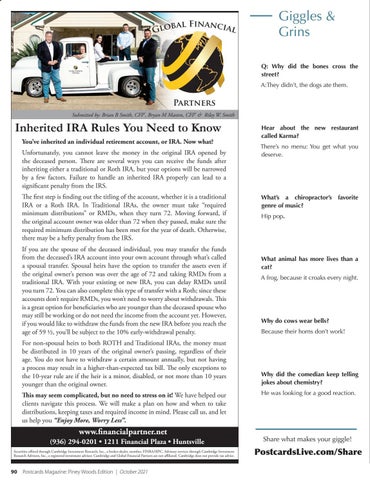Giggles & Grins Q: Why did the bones cross the street? A:They didn’t, the dogs ate them.
Partners Submitted by: Brian B Smith, CFP®, Bryan M Masten, CFP® & Riley W. Smith
Inherited IRA Rules You Need to Know You’ve inherited an individual retirement account, or IRA. Now what? Unfortunately, you cannot leave the money in the original IRA opened by the deceased person. There are several ways you can receive the funds after inheriting either a traditional or Roth IRA, but your options will be narrowed by a few factors. Failure to handle an inherited IRA properly can lead to a significant penalty from the IRS. The first step is finding out the titling of the account, whether it is a traditional IRA or a Roth IRA. In Traditional IRAs, the owner must take “required minimum distributions” or RMDs, when they turn 72. Moving forward, if the original account owner was older than 72 when they passed, make sure the required minimum distribution has been met for the year of death. Otherwise, there may be a hefty penalty from the IRS. If you are the spouse of the deceased individual, you may transfer the funds from the deceased’s IRA account into your own account through what’s called a spousal transfer. Spousal heirs have the option to transfer the assets even if the original owner’s person was over the age of 72 and taking RMDs from a traditional IRA. With your existing or new IRA, you can delay RMDs until you turn 72. You can also complete this type of transfer with a Roth; since these accounts don’t require RMDs, you won’t need to worry about withdrawals. This is a great option for beneficiaries who are younger than the deceased spouse who may still be working or do not need the income from the account yet. However, if you would like to withdraw the funds from the new IRA before you reach the age of 59 ½, you’ll be subject to the 10% early-withdrawal penalty. For non-spousal heirs to both ROTH and Traditional IRAs, the money must be distributed in 10 years of the original owner’s passing, regardless of their age. You do not have to withdraw a certain amount annually, but not having a process may result in a higher-than-expected tax bill. The only exceptions to the 10-year rule are if the heir is a minor, disabled, or not more than 10 years younger than the original owner. This may seem complicated, but no need to stress on it! We have helped our clients navigate this process. We will make a plan on how and when to take distributions, keeping taxes and required income in mind. Please call us, and let us help you “Enjoy More, Worry Less”.
www.financialpartner.net (936) 294-0201 • 1211 Financial Plaza • Huntsville Securities offered through Cambridge Investment Research, Inc., a broker-dealer, member, FINRA/SIPC. Advisory services through Cambridge Investment Research Advisors, Inc., a registered investment advisor. Cambridge and Global Financial Partners are not affiliated. Cambridge does not provide tax advice.
90 Postcards Magazine: Piney Woods Edition | October 2021
Hear about the new restaurant called Karma? There’s no menu: You get what you deserve.
What’s a chiropractor’s favorite genre of music? Hip pop.
What animal has more lives than a cat? A frog, because it croaks every night.
Why do cows wear bells? Because their horns don’t work!
Why did the comedian keep telling jokes about chemistry? He was looking for a good reaction.
Share what makes your giggle!
PostcardsLive.com/Share



